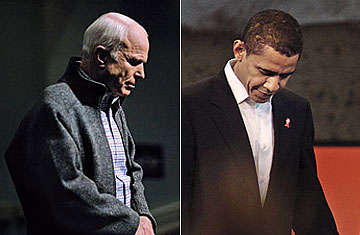
Presidential candidates Sen. John McCain, left, and Barack Obama, right
It is a sign of how seriously Americans take religion that the first general-election meeting between Barack Obama and John McCain will take place not in a university auditorium, with network news anchors as moderators, but in the sanctuary of an Evangelical megachurch with a Southern Baptist pastor playing the role of interrogator. For two hours on Saturday evening, the two presumptive presidential nominees will field questions on policy issues, character and faith (consecutively, not debating each other) from Rick Warren at his Saddleback Church in Orange County, Calif.
At first glance, the decision to participate seems like a no-brainer for both candidates. Americans remain, to the continuing bafflement of other Westerners, stubbornly religious — a consistent 85% tell pollsters at the Pew Research Center that religion is an important part of their life. And for the most part, they don't separate religion from the political sphere. In those same polls, 70% of Americans say they want their President to be a person of faith. For Obama and McCain, an evening spent discussing matters of faith with the country's most popular Evangelical author and pastor would seem a relatively easy way to get that particular ticket punched.
But it's been a rough year so far for religion on the campaign trail. During the primary season both candidates had to distance themselves from, and ultimately condemn, religious supporters who delivered embarrassing and intolerant sermons. Both face skepticism from key blocs of religious voters. Saturday's forum provides an opportunity for the two candidates to reassure the faithful — or it could provide further ammunition for their critics.
Obama's last visit to Saddleback was in December 2006 when he and Kansas Senator Sam Brownback spoke at Warren's annual conference on HIV/AIDS. Brownback went first and joked to the crowd that the last time he and Obama shared a stage, it was at a meeting of the NAACP and he didn't receive the most rousing of welcomes. Turning to Obama, he said, "Welcome to my house." The crowd laughed, but when it was Obama's turn, the Democrat had a message for his Republican colleague. "With all due respect, Sam," said Obama, "this is my house, too."
That refusal to cede religion to Republicans has characterized Obama's presidential campaign as well. He has a larger and more comprehensive religious-outreach operation than any Democrat in history. According to an August poll from the Barna Group, Obama leads McCain in every religious demographic — mainline Protestants, Catholics, Jews, Muslims — except for white Evangelicals.
But those white Evangelicals are key, and so far Obama's support among them is not rising above John Kerry's numbers from 2004. One major stumbling block appears to be abortion. Nearly two-thirds of white Evangelicals in a recent TIME poll say they could vote for a candidate whose position on abortion differed from theirs. And many Evangelicals have, like Warren, broadened their agenda of concerns to include issues that should favor Obama like global poverty and the environment. But in practice, abortion continues to be a threshold issue for a large number of Evangelical voters.
Warren has already said he will raise the issue with the candidates on Saturday, and Obama could well take advantage of the opportunity. In closed-door meetings throughout the campaign, he has impressed pro-life religious leaders with his argument that measures to prevent unwanted pregnancies and to support women who want to carry their babies to term could actually lower abortion rates more substantially than purist approaches that seek to overturn Roe v. Wade and outlaw abortion.
But Obama hasn't been as vocal publicly about such an approach to the abortion issue, which has raised concerns about his commitment. The recently released 2008 Democratic platform has only fed the skepticism. While the party did insert for the first time language promoting efforts to reduce abortion rates, it dropped two phrases that had traditionally been welcomed by pro-life voters, including the Clinton-era assertion that abortion should be "rare." Large numbers of Evangelical and Catholic voters will be listening for Obama to articulate his abortion position in his conversation with Warren. A significant number of them remain undecided in the race, and their votes may hinge on his answer.
McCain will also need to ace the abortion quiz at Saddleback. Despite an unwavering record of opposition to abortion, the Arizona Senator has at times worried religious conservatives by suggesting he would consider a pro-choice running mate — most recently this week while discussing former Pennsylvania governor Tom Ridge. Those comments, combined with McCain's support for stem-cell research, explain the relatively low levels of enthusiasm among Evangelicals for his candidacy. Evangelicals have also been waiting for McCain to speak personally about his own faith. When it comes to discussing religious beliefs, he has a low-key approach more in common with Bush the elder than with the current President. But George W. Bush's frequent use of religious language and willingness to discuss his faith have primed religious conservatives to expect that same level of openness from candidates.
In the past, when faith questions have been put to McCain, he has answered by talking either about how his father prayed for him while he was imprisoned in Vietnam or about a guard in one of the prison camps who shared his Christianity by sketching a cross in the sand with his toe. Both are moving stories, but a number of high-level Evangelicals have complained that they illustrate others' faith instead of McCain's. Warren will undoubtedly give McCain the chance to talk in personal terms about his faith. But as many a politician has learned, speaking about faith in a genuine way can be difficult. "If he tries to go out on that stage and be Billy Sunday, he's going to bomb," cautions one conservative religious leader. "If he's not comfortable saying 'Jesus lives in my heart,' then for crying out loud, don't say it."
